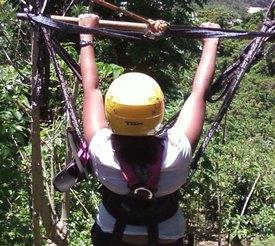Looking for fellow Guide and Scout Leaders

asciiqwerty
Posts: 565 Member
I'm a Guide Section Leader in the UK, as well as leadership mentor and adult trainer. On camp, I tend to be QM.
I love Guiding, and engaging with all the really motivated leaders and volunteers, but often notice that many of us carry a few extra pounds. I was wondering how many other volunteer youth leaders were on here, and whether any of you felt like sharing support and motivation.
I feel, the healthier I am, the more likely I am to be able to provide an exciting, adventurous and challenging programme to the Guides in my unit. Which can be hard, when in our "girl lead guiding" the Guides in my unit continually request food based activities
I love Guiding, and engaging with all the really motivated leaders and volunteers, but often notice that many of us carry a few extra pounds. I was wondering how many other volunteer youth leaders were on here, and whether any of you felt like sharing support and motivation.
I feel, the healthier I am, the more likely I am to be able to provide an exciting, adventurous and challenging programme to the Guides in my unit. Which can be hard, when in our "girl lead guiding" the Guides in my unit continually request food based activities
0
Replies
-
I am not a leader but I am just curious on what are you gonna do about it? I meant what you just written here.0
-
Personally, in my unit, I encourage them to have a good relationship with food and to know what they're eating. We did an activity recently on Energy, sport and health drinks, with taste test and nutritional contents comparison. They were very surprised at how many of the energy drinks were higher in sugar than coke.
When I QM at camp, I insist on cooking everything fresh, and getting the guides involved with preparing the ingredients, something that they don't always get a chance to do at home.
So it's a slow burn, every time they ask for an activity, my challenge is to find a way to make the activity balanced and give the right health and well-being approach. I also push adventurous and physical activities (we're not just a craft and cake unit) so this week we went on a night hike during our meeting - Just for fun
But I'm also looking for ideas fro others as to what else I can do.0 -
I'm a Boy Scout and Cub Scout leader. I have noticed much the same thing: many of my fellow adult leaders carry some extra weight. Many seem to carry a LOT of extra weight.
Here in the U.S. they have launched the ScoutStrong program and are implementing this across the organization. It is being included in camp programs and they are encouraging individual units to focus on it:
http://www.scouting.org/scoutstrongpala.aspx
The Boy Scout and Cub Scout programs have elements focusing on physical fitness and nutrition as well, although I'm not sure how well received these lessons are.
The scouting program has been one of my motivators for losing weight and getting in shape. I'm attending Philmont Scout Ranch this summer with two of my sons, and there is a very strict height/weight chart that applies to all applicants. Getting below the maximum allowed weight for my height was my first goal. I'm now in their "normal" range. Now I am training hard for heavy backpacking at 3000 m and above. Last year we went canoeing in the Boundary Waters and that was amazing too.
ETA: My ticker is a panorama from Warrior Hill on Lac la Croix in the Boundary Waters.0 -
not a leader myself although my mum was a cubs/scout leader/GSL for years
I think at this age the most important thing is to promote physical activity, and as far as diet is concerned, to promote a balanced diet and a healthy relationship with food. A lot of teenagers, girls especially, think they're fat when they're not or they go on dangerously restrictive diets because they have no clue about nutrition. Teaching about nutrition (i.e. the 7 nutrient groups people need) plus how to design balanced meals (which contain each of these and not too much of anything) is important too. I wouldn't advise focusing on obesity, focus on all aspects of health. Obesity is just one aspect of health and one that's focused on too much at the expense of others.... strong muscles, strong bones, healthy circulatory system, healthy lungs, being fit enough to walk up several flights of stairs without being exhausted... these are all important health aspects that kids need to focus on as well, and this + balanced diet + encouraging regular physical activity (at meetings and encourage them to do stuff outside of meetings as well, e.g. sports clubs or whatever they like to do) should have an impact on obesity, without obesity ever being the main focus. The danger of overfocusing on obesity is that some kids are already paranoid about it or think they're fat when they're not or if they are fat they're likely to be extremely conscious of it, and so it can cause issues such as unhealthy attitudes towards food, restrictive dieting and in extreme cases even eating disorders.0
This discussion has been closed.
Categories
- All Categories
- 1.4M Health, Wellness and Goals
- 396.9K Introduce Yourself
- 44.2K Getting Started
- 260.9K Health and Weight Loss
- 176.3K Food and Nutrition
- 47.6K Recipes
- 232.8K Fitness and Exercise
- 454 Sleep, Mindfulness and Overall Wellness
- 6.5K Goal: Maintaining Weight
- 8.7K Goal: Gaining Weight and Body Building
- 153.3K Motivation and Support
- 8.3K Challenges
- 1.3K Debate Club
- 96.5K Chit-Chat
- 2.6K Fun and Games
- 4.5K MyFitnessPal Information
- 16 News and Announcements
- 18 MyFitnessPal Academy
- 1.4K Feature Suggestions and Ideas
- 3.1K MyFitnessPal Tech Support Questions


